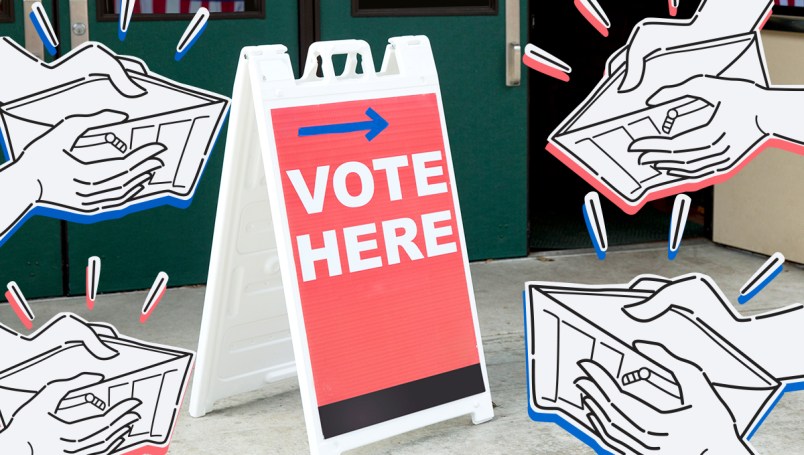The next few weeks will determine the fate of a high-profile campaign to restore the voting rights of hundreds of thousands of formerly incarcerated Floridians.
That effort took its most substantive blow to date on Tuesday, with the state House Criminal Justice Committee voting on party lines to approve a bill that would severely restrict who could apply to get their voting rights back. The 10 Republicans who form a majority on the committee say their intention is simply to clarify the intention of Amendment 4, the constitutional amendment Florida voters approved by over 60 percent in November. Critics say the bill’s strict fine repayment requirements amount to a poll tax that will disproportionately disenfranchise poor black voters.
Other committees may still tinker with or amend the new House bill, and the final version would need to be approved by the entire legislature before Florida’s legislative session ends in early May. But with Republicans in control of both chambers and Republican Gov. Ron DeSantis’ expressed opposition to Amendment 4, voting rights advocates are deeply worried—and starting to prepare litigation.
“The proposed bill is—especially when it relates to the fines and fees portion—the worst case scenario of what could have been introduced,” Ashley Thomas, Florida state director of Fines and Fees Justice Center, told TPM. “Because everything is included, every type of cost or fee—even things that a judge didn’t impose but the Department of Corrections or a probation officer could have imposed. It really is incredibly broad.”
Phil Telfeyan, the executive director of Equal Justice Under the Law, called the fines and fees language “particularly devastating.”
“This pending legislation accelerates the need for litigation and for the courts to protect the constitutional rights of people who live in Florida because the legislature is obviously not willing to do that,” Telfeyan added.
The bill takes the most restrictive view of the language laid out in the amendment, which pledged the “automatic” restoration of the franchise to those who have completed “all terms of their sentence, including parole or probation” and were not convicted of murder “or a felony sexual offense.” The intention of the amendment was to streamline Florida’s backlogged, arbitrary system for restoring felon voting rights.
Under the bill, every felony sex offense on Florida’s books, from prostitution to placing an adult entertainment store within 2,500 feet of a school, would disqualify an individual from being covered by Amendment 4. Former felons would have to pay back all court fees and costs—even those not mandated by a judge as part of a person’s sentence—before becoming eligible to vote.
Republicans on the House Criminal Justice Committee deny that these provisions are unnecessarily broad or punitive.
“To suggest that this is a poll tax inherently diminishes the atrocity of what a poll tax actually was,” committee chairman Jamie Grant (R) said during Tuesday’s hearing, according to the Tampa Bay Times. “All we’re doing is following statute.”
As TPM has reported, Florida has some of the nation’s highest and most varied kinds of court costs. Felony convictions make it difficult for former offenders to obtain decent-paying jobs, and those unable to start paying off court debt after leaving prison see their fines go to private collections agencies. Under state law, those agencies can impose up to an additional 40 percent surchage on the amount owed.
Advocates fear that the new bill would result in lifetime disenfranchisement for former felons who cannot afford to pay, even those who committed non-violent property crimes.
“Somebody who is well off could vote and somebody who is poor could not, and that is not the intent behind Amendment 4,” FFJC’s Thomas said.
Thomas’ group, the ACLU of Florida, the Florida Rights Restoration Commission, Latino Justice and other groups that supported the amendment are now making the rounds at the statehouse, urging lawmakers to vote against the bill. Some groups are also preparing a legal response.
“We’re certainly not waiting to see [what happens],” Telfeyan of Equal Justice Under the Law, told TPM. “We’re working up our legal research.”
Gaby Guadalupe of the ACLU of Florida said the organization doesn’t comment on potential litigation but “will explore all options in order to ensure that the will of the people is not thwarted.”







I was almost going to say that I’d rather live next to a felon or a sex offender than a Republican. And then I realized that there is a substantially high probability of overlap.
And you thought Florida was a swing state. Those fuckers in Tallahassee spend their time suppressing the will of the voters .
This is why we go to referendums in the first place
They did it with Fair Districts
They did it with Medical Pot
They’re doing it with Voter suppression
God I hate them all
If we can’t win the referendum, we’ll pass a law saying we won the referendum.
Overriding a Florida Constitutional Amendment?
All in a days work for Trump’s GOP.
They subsidize local sugar but claim to hate socialism.